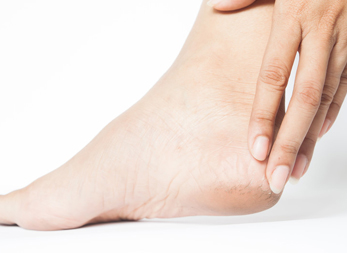Cracked heels are a common concern, especially among women. According to an article from Healthline, a survey found that 20 percent of adults in the United States experience cracked skin on their feet. Cracked heels are caused by callused, dry skin. Deep cracks along the back edges of the heel can lead to bleeding feet and infections, and cause pain while walking.

- Intense pressure or friction on the feet
- Prolonged standing
- Obesity
- Frequent use of open heeled shoes, poorly fitting shoes, or friction from the back of the shoes
- Medical conditions such as diabetes and an underactive thyroid, and foot conditions like heel spurs or athlete’s foot
- Poor gait
- Cold weather
If your condition is not severe, these simple home remedies could help:
- Use a heel balm. These products are designed to moisturize, soften, and exfoliate dead skin.
- Soak your feet and apply a good moisturizer. Avoid scrubbing your feet when they are dry as it can worsen the skin damage.
- Applying liquid bandage to the fissures can seal the wound and prevent further cracking/infections.
- Honey and coconut oil come with antimicrobial properties and can improve cracked heels.
If the condition does not respond to home remedies, they could be caused by a medical condition. Consult a podiatrist to get the right treatment.
When it comes to preventing cracked heels, your shoes matter. Use footwear with a robust, wide heel that supports and protects your heels. Other preventive measures include:
- Drinking plenty of water
- Avoiding excessively hot showers and harsh soaps
- Applying a thick foot cream at night and then cover your feet with socks to lock in moisture. Thick cream work as a protective barrier and helps to retain the moisture.
- To prevent your heel skin from thickening, use a pumic stone after showering. Moisturizing with olive oil will help the cracks heal.
- If you have diabetes, make sure you inspect your feet daily and avoid removing calluses yourself as it can cause infection.
- Wear good quality or clinically-tested padded socks
- Use silicon heel cups to keep the heels moisturized and to prevent the heel pad from expanding.